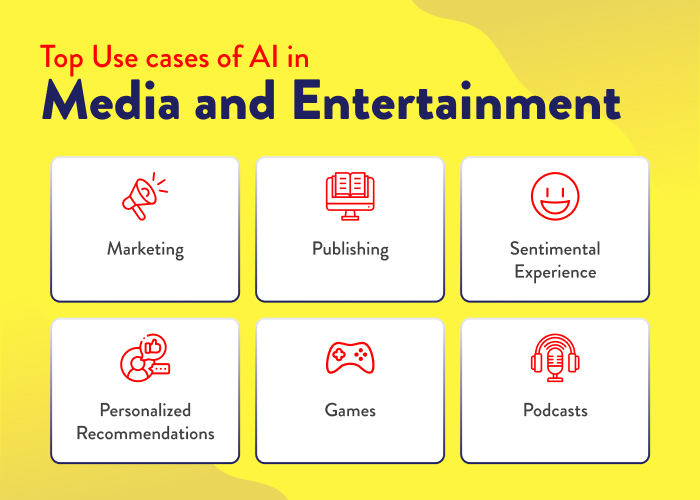Top Use cases of AI in media and entertainment

Marketing
AI holds a special place in the world since it helps with lead generation, customer interaction, and product presentation. AI improves productivity in marketing; ChatGPT and similar solutions enable rapid content creation for emails, reports, taglines, and other purposes.
With the help of AI integration, stakeholders, company owners, and marketers can carry out expert design strategies, product engineering, and effective delivery techniques with the goal of providing end users with significant value. Robust chatbots, campaign development, content personalization, and process automation help the marketing sector create compelling marketing strategies and live up to customer expectations. Thus, AI in media and entertainment is improving user experiences, streamlining operations, and changing the nature of the sector.
Publishing
AI has left its mark by streamlining repetitious processes, cutting expenses, and improving the efficiency of the book publishing industry. Automation enhances productivity and prediction, from the last stages of text preparation to delivery to readers. Thus, publishers can provide the most engaging material for their audiences by quickly analyzing vast volumes of data in less time. Furthermore, with the use of AI-powered technologies, publishers may create text according to a set of criteria.
In the media and entertainment sector, AI can quickly summarize a book and compile a summary. It also uses machine learning techniques to help in the creation of book covers and layouts. AI can suggest marketing and distribution channels based on reader preferences.
Sentimental Experience
In order to analyze feelings in the media and entertainment sector, AI must be able to recognize the emotions that users display when they engage with and watch material. Thus, when it comes to web or mobile apps, sentiment analysis improves user engagement by tailoring content according to audience responses.
Furthermore, by examining user sentiment, app developers may create suggestions, interactive components, and features that are iterative and emotionally relevant. This brilliant idea opens the door for the media and entertainment sectors to consistently relate to changing trends.
Personalized Recommendations
One of the AI-driven developments in the media and entertainment space, particularly in the development of the app market, is content customization. Businesses in media and entertainment can generate personalized content recommendations by utilizing machine learning systems to analyze user behavior, viewing history, and preferences.
AI algorithms are used by businesses like Netflix, and Youtube to generate personalized suggestions that boost user engagement. The success of media and entertainment applications and user pleasure are both impacted by the precise AI-enabled guidance. The way digital content is generated and consumed is changing as a result of AI’s integration into the media and entertainment sectors.
Games
Due to the high level of audience involvement in the gaming sector, firms have made major investments in the field of entertainment and media. The introduction of AI into games has caused a major change in entertainment. AI-enabled NPCs (Non-Player Characters) may exhibit complex behavior and adjust to player actions, resulting in a complex and engaging gaming environment.
Podcasts
Podcasts have become increasingly popular in the ever-changing world of technology. Businesses provide an information channel by utilizing strategic content development.
The media and entertainment sector may create tailored, interactive, and interesting content by utilizing AI, which makes it a great option for those with hectic schedules who lack the time to read or watch information. AI in media and podcasting can speed up and simplify audio editing.
Natural language processing, or NLP, is a remarkable branch of artificial intelligence that generates and analyzes human language. NLP is used to automatically create subtitles for people who are hard of hearing. Thus, audio can be transcribed into text format. AI is also changing the way that original podcast content is produced, improving listener engagement, and changing processes in the media and entertainment sectors.
Conclusion
In conclusion, the infusion of AI in media and entertainment industry has ushered in a new era of innovation and efficiency. From revolutionizing content creation through automation to enhancing user experiences with personalized recommendations, AI has become a driving force behind the industry’s evolution. As AI technologies continue to advance, the Media and Entertainment industry will undoubtedly witness further transformative changes, offering exciting possibilities for creators and consumers alike.
FAQs
How does AI impact content creation in the Media and Entertainment industry?
What role does AI play in content recommendation?
How does AI improve user experience in streaming services?
Are there any ethical considerations with AI in Media and Entertainment?
What is the future of AI in Media and Entertainment industry?
Ravi Bhojani is the Chief Marketing Officer (CMO) at Alian Software, where he spearheads the company’s marketing strategies and drives its brand presence in the competitive IT services landscape. With over a decade of experience in the technology and marketing sectors, Ravi has consistently demonstrated his ability to blend innovative marketing techniques with deep industry knowledge to deliver outstanding results.